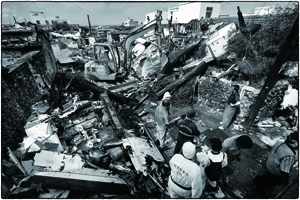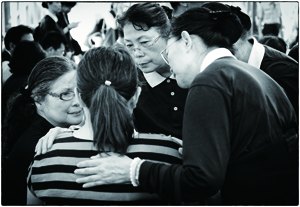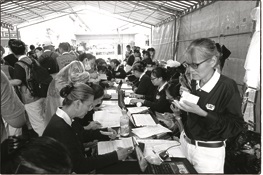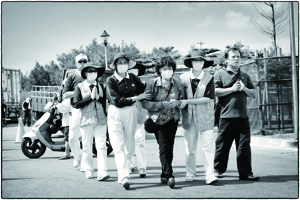

| Traversing Life and Death: Penghu Plane Crash | ||||||||||||
| By Li Wei-huang Translated by Tang Yau-yang Photos by Hsiao Yiu-hwa | ||||||||||||
Their lives vanished in a flash, rendering their worldly pursuits meaningless and leaving their loved ones in grief and in reflection. Tzu Chi volunteers accompanied families of the plane crash victims, helping them and praying with them during this difficult time.
Penghu, an island county located off the southwestern coast of Taiwan, was as sunny as ever on this hot afternoon, but the usual quiet was pierced by harrowing cries and wails, making Xixi, an otherwise serene village, not so peaceful. Family members of the deceased cried loudly, while the smell from the burnt wreckage of the plane mingled with and seemed to add to the sadness in the air. “My son lost his eyes [in the crash]. I’m afraid he can’t find his way home,” wailed one mother. Standing next to her was Chen Xiu-yun (陳秀雲), holding an umbrella up to shade her from the scorching sun and putting her other arm on her shoulder as a gesture of comfort. Chen was one of the Tzu Chi volunteers from Kaohsiung, southern Taiwan, who were on the scene to provide support to the families of the plane crash victims. The crash On July 23, 2014, Typhoon Matmo brought heavy rain, thunder and lightning to Penghu. In the bad weather, TransAsia Airways flight GE222, travelling from Kaohsiung to Magong Airport in Penghu, crashed into Xixi Village. Of the 58 passengers and crew on board, 48 were killed and 10 were injured.
When Chen Xiu-yun heard the news, she hurried to Kaohsiung International Airport to console family members of the passengers and crew who were waiting anxiously for news of their relatives. Within less than 12 hours, she and 38 fellow volunteers, setting aside their own affairs and carrying just a few changes of clothes, flew to Magong to provide what help they could. The crash damaged 14 private homes. A section of the fuselage landed near the house of a Miss Yang without her even knowing about it, and a big piece of the airplane tail got stuck beside a wall of her house. When she realized that something had gone wrong, she put on a raincoat and went outside to take a look. Huge fireballs prevented her from getting too close, so she returned home and went to the second floor. From there, she saw that many emergency responders, without wasting time to put on rain gear, were scrambling to search for survivors or to remove bodies. She would later find the sharp cries of some crash victims hard to forget. Yet despite the grisly sounds and sights, the rain, and the abhorrent smell, the responders—soldiers, police, and firefighters—handled the bodies or body parts with composure, respect, and without the slightest hesitation. She was very moved by what she saw. Though the crash totally turned her life upside down and relatives and friends advised her to move away for a while, Miss Yang insisted on staying put. She had seen stories of the deceased in the news. They were all decent, good people, and her heart really went out to them. At the same time, she had seen heart-warming scenes of people helping out in the aftermath of the tragic event, such as the Tzu Chi volunteers clad in their blue shirts and white pants. They showed up at the scene soon after the crash. They accompanied family members to the site, extended care to emergency responders, and did whatever they were asked to do. Miss Yang really admired what these people did, and her heart was soothed by what she witnessed. In addition to helping out at the crash site, Tzu Chi volunteers held a prayer service for local residents four days after the disaster at the activity center in Xixi Village, hoping to bring peace to minds traumatized by the calamity. People whose homes were damaged took comfort in knowing that it could have been much worse, and they were glad that they had emerged from the disaster largely unscathed.
By their side The 39 volunteers from Kaohsiung joined local Tzu Chi volunteers in serving people affected by the crash. They set up a service center on the grounds of a funeral home on July 24 so they could be close to mourning family members.
The local volunteers were generally at least 50 years old, mostly housewives, owners of small stores, public servants, or retirees. They divided up into three groups: One group covered the hospital, another the crash site, while the third covered the funeral home. Volunteers accompanied the bereaved, chanted the Buddha’s name for the deceased, visited families whose houses were damaged, delivered emergency cash and hot food, and helped in whatever other ways they could. They did this right up until the service center closed on August 3.
Xue Pei-qi (薛佩麒), despite being already 86, worked at the service center from morning till night. Guo Mei-jing (郭美靜) and her husband operated a breakfast truck, but during this time they often had to put off their business in order to drive other volunteers or care for the bereaved. Gao Zheng-fang (高正方) and his brother Gao Zheng-fu (高正福) repaired boats for a living, and they, like the Guos, put their volunteer work ahead of their business for the duration. On July 23, Weng Shun-an (翁順安), who worked as an electrician at the Magong Airport, was in the airport traffic control tower repairing equipment damaged by lightning. As soon as he got off duty the next morning, he changed into his volunteer uniform and hurried to the funeral home to help out. At the service center, 68-year-old Huang Jing-xing (黃景星) sometimes helped look after grieving family members, and sometimes he just sat quietly in a corner. He did not look particularly well. It turned out that his whole stomach had been removed because of cancer ten years earlier. As a result of that, any food he ingested went straight from the esophagus to the small intestines. He could only eat small quantities of food at frequent intervals, and he was often bothered by acid reflux. Nevertheless, he wanted to offer what help he could. At the time of the calamity, Huang was caring for his father-in-law at a hospital. He asked the old man to excuse him so he could join the Tzu Chi effort. His request was granted, and he quickly hired a substitute sitter before he and his wife, also a Tzu Chi volunteer, started their daily shifts at the funeral home. When family members broke down, Huang and his wife would step up to help steady them, utter gentle words of comfort, or offer them tissue paper. It was hard for volunteers to be in this environment and not be affected by the emotions on the scene, but still the couple persisted in doing their best. About two dozen of the deceased were registered residents of Penghu, and local volunteers knew some of them personally. The volunteers therefore really wanted to help ease the pain that the family members felt and help them through this difficult time.
Two crashes Xu Chang-ci (許常次), another volunteer in Penghu, was in his 70s. When he arrived at the hospital after the plane crash, he heard a man say, “Oh, no! My son and daughter were both on this plane.” The man was in such agony that he was almost unable to stand. As a parent, Xu could really feel for him. The scene reminded Xu of another plane crash, on May 25, 2002, when a China Airlines plane disintegrated in midair near Penghu, killing all 225 onboard. Pieces of the wreckage and human remains fell into the ocean. Xu volunteered to help that time too. He remembered meeting a father who was there to identify his son. Since recovery of human bodies in the sea is a much harder and more time-consuming task than on-land recovery, it took almost a month for his son’s body to be found. The father took two suits, one larger than the other, with him when he went to claim the body. He did so because he did not know how swollen his son’s body would be after being in the water for so long. Sadly, neither suit fit the remains. The father cried out, “How can he go to meet our ancestors without being properly dressed?” For the crash in 2002, Xu and his wife shut down their clothing store for more than a month and devoted themselves to helping victimized families. Now, 12 years later, he was experiencing the aftermath of another crash. These experiences taught him that the physical body of a person is quite fragile, and he does not want to become attached to his own body. He has already instructed his family on how to handle his corpse when he passes away: “Go ahead and donate the entire body or viable organs. After the rest is cremated, just scatter the ashes into the sea or on land. It doesn’t matter to me either way.” He has seen through life and death. Like Xu, Chen Yong-ting (陳永庭), a professional undertaker who has volunteered with Tzu Chi for more than 20 years, still has vivid memories of the 2002 crash. He remembers Taiwanese Coast Guard boats travelling back and forth on the sea recovering cadavers. There were so many corpses that the sailors were exhausted from moving them. They had nightmare after nightmare at night. Chen recalled clearly the sights and smells that he experienced when he accompanied family members to identify their loved ones. “I’ll never forget them,” he said. The sights and smells were so horrendous that they could knock one down. But Chen knew he could not shrink from the task at hand; he had to hang in there for the grieving families.
Lesson learned Wang Yu-mei (王玉梅), a longtime Penghu volunteer, was in Taipei visiting her family when the 2014 crash occurred. The next morning, she flew standby and arrived in Penghu just before noon. She rushed straight to the funeral home, without even taking time to eat lunch. Once there, she served meals to the families, did the dishes, cleaned bathrooms, picked up empty beverage bottles, and collected food waste from meal boxes, some of which had not even been touched. She was in and out of the funeral home every day, and inevitably the atmosphere got to her. “I go home and I can’t help crying,” she said. One of the victims was a friend’s son. Wang, too, has volunteered for Tzu Chi for more than 20 years, and she also clearly remembered the 2002 crash. Though that aircraft disintegrated in midair, she heard about the bodies of a couple found amidst the wreckage, their seats still next to each other, still holding hands. In 2002 she worked through the entire care process from beginning to end. “I was busy for one month and 27 days—57 days in all,” she recalled. The experience left an indelible memory.
Now, helping out in the 2014 crash, she knew that in moments of extreme pain and sadness, anything she could say to the bereaved would seem entirely superfluous. So, when she saw them crying, sometimes she just cried with them. Some of the volunteers’ voices became hoarse after chanting the Buddha’s name for days in a row, but they didn’t return home to rest. Instead, they toughed it out and stayed by the side of family members. After being identified, some of the corpses were shipped back to Taiwan. One volunteer said that a family that he had accompanied said that at least they had found their beloved’s body—even though it was incomplete—and they could now take him home. Life is unpredictable. No one knows what will happen in the next moment. Some people had moved up their schedules and boarded the fateful flight while others had cancelled their reservations and avoided the tragedy. Neither could have known what their decisions would mean for them. Pondering the unpredictability of life, volunteers learned from the disaster to be less attached to worldly things. Penghu volunteer Wang Li-yun (王麗雲) said that when it was her time to go, she just hoped to have a piece of cloth over her body. Kaohsiung volunteer Huang Mei-yu (黃美玉), on the other hand, learned from this experience to cherish her loved ones. Having seen the pain of the bereaved families as they wailed in anguish for losing their loved ones, she said, “For those of us who still have our families around us, we must appreciate these ‘blessings at our fingertips,’” she said. “Love people around us and treasure every moment—this is all we can do.” |















|






